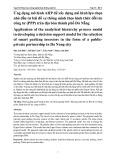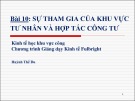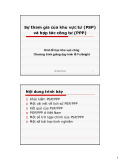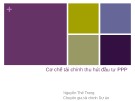
http://www.iaeme.com/IJM/index.asp 32 editor@iaeme.com
International Journal of Management (IJM)
Volume 9, Issue 3, May–June 2018, pp. 32–41, Article ID: IJM_09_03_004
Available online at
http://www.iaeme.com/ijm/issues.asp?JType=IJM&VType=9&IType=3
Journal Impact Factor (2016): 8.1920 (Calculated by GISI) www.jifactor.com
ISSN Print: 0976-6502 and ISSN Online: 0976-6510
© IAEME Publication
INITIAL PUBLIC OFFERINGS (IPOS) IN GULF
CO-OPERATION COUNCIL COUNTRIES
Dr. M. Selvam
Alagappa University, Karaikudi
Mr. Rengarajan Veerasamy
PhD Research Scholar, Alagappa University,
Lecturer, Arab Open University, Sultanate of Oman
ABSTRACT
Initial Public Offering is the way for privately held and limited liability companies,
partnership firm to mobilize huge sum of capital and get the legal status as public limited
company. The boom in IPO market is indicated by number of IPOs coming up in that
country. The full subscription or oversubscription of such offers indicate investors have
got some information about that company and believe that they would get super normal
returns by investing. Returns on IPO investment becomes the major contributor of success
of and the regulatory framework available in an economy must provide for space
abundantly for non-public companies to float IPOs in the market. At the same, the
economic conditions prevailing in a country do play a significant role facilitating
investors and companies to float IPOs. There are other important contributors for the
success of an IPO. The Gulf Cooperation Council Countries (GCC) namely Kingdom of
Bahrain, State of Kuwait, State of Qatar, Sultanate of Oman, Kingdom of Saudi Arabia
and United Arab Emirates are oil dependent economies and would like to diversity their
oil-based economy to industrialized economies. The governments of these countries are
moving towards establishing industries in the respective countries to create good
employment opportunities and to channelize savings of people into productive
investments.
Keywords: Initial Public Offerings, Non-Public Companies, Public Limited Companies,
GCC Countries, oil-based economies, Financial Intermediaries, Legal Framework, first
day and current day returns.
Cite this Article: Dr. M. Selvam and Mr. Rengarajan Veerasamy, Initial Public Offerings
(IPOs) in Gulf Co-operation Council Countries, International Journal of Management, 9
(3), 2018, pp. 32–41.
http://www.iaeme.com/IJM/issues.asp?JType=IJM&VType=9&IType=3

Dr. M. Selvam and Mr. Rengarajan Veerasamy
http://www.iaeme.com/IJM/index.asp 33 editor@iaeme.com
1. INTRODUCTION
When companies operate at a smaller level, their financial requirements will be lesser.
Companies prefer to arrange for a bank loan and other borrowing ways and means. When
businesses grow up and expand for those non-public companies, the need arises for IPO
issues. Initial Public Offerings are first offer of shares by a company to establish them as a big
corporate house legally bound. Certo et al., (2001) explains that the deciding to go for public
issue is one of the hardest and crucial decisions business firms make as it throws several
advantages and challenges for them
1
. The GCC countries namely Kingdom of Bahrain, State
of Kuwait, State of Qatar, Sultanate of Oman, Kingdom of Saudi Arabia and United Arab
Emirates with their overwhelming dependency of oil sector cannot comfort with such lop-
sidedness in a world of uncertainty and risk. The oil and gas sector in contributing widely in
their respective GDP (nearly 50%,), in the four GCC Countries namely Saudi Arabia, Qatar,
Kuwait and United Arab Emirates, whereas in Bahrain and UAE has focused on
diversification and getting around 24% and 32% oil and gas contribution respectively
2
(Holland and You, 2017)
2
, The GCC countries must diversify their economies with good
investments in very many economic sectors that would give a stable economic footing, risk
management and also present a façade of diversified economy. In this context, attracting
investments from the public, institutions and others supporting venture promoters is crucial.
Financial intermediaries have also a significant role in bridging the retail and institutional
investors on the one hand and the promoter investors on the other.
2. LITERATURE REVIEW
Rao & Shankaraiah (2003) in their article “Stock Market Efficiency and Strategies for
Developing GCC Financial Markets: A Case - study of Bahrain Stock Market” argue that
stock markets must be efficient in order to ensure fair returns to the investors. Stock markets
need to have informational efficiency so that the markets do offer same returns to all the
investors. They argue that stock markets in GCC countries do not exhibit informational
efficiency and market tends to work on asymmetric information resulting inefficiency in
informational.
3
Simpson (2004) describes in his article “Stock Market Efficiency and Development in the
GCC”, that GCC stock markets are not efficient as it has been portrayed by Fama (1970). He
recommends that amalgamation of the stock exchanges in GCC to get informational
efficiency in the markets. The GCC market is characterized by lower trading volumes, lower
market capitalization and the lower informational access. He argues clearly that the market
needs to show up tremendous improvements and these stock markets will have to be
independent on its own.
4
Abumustafa (2007) presents in his article “A Review of Regulation, Opportunity and Risk
in Gulf Cooperation Council Stock Markets the Case of Kuwait”, that GCC countries are
showing up tremendous changes and performances in the stock market operations including
Kuwait Stock Exchange. The stock market indices of the GCC countries are showing up
improvements drastically and also showing up an increase more than 80%, due to higher oil
prices, lower interest rates, and general decline in regional uncertainty and improvements in
the foreign direct investments. It has been evident from this study that regulatory
performances is mandatory for any security market and GCC countries are taking essential
steps to ensure fair market trading performance.
5
Roult & Arouri (2009) argue in their article titled “Oil prices and stock markets: what
drives what in the Gulf Corporation Council countries?” they argue that the decision makers
on oil prices in GCC countries will have to carefully evaluate the effect of such changes in
prices on the stock markets. The study shows that there is a positive correlation between the

Initial Public Offerings (IPOs) in Gulf Co-operation Council Countries
http://www.iaeme.com/IJM/index.asp 34 editor@iaeme.com
oil price changes and the stock market prices and the relationship is mostly bi-directional in
Saudi Arabia. In other countries the oil prices are creating an impact on the stock markets and
the stock prices, but the opposite direction movement is not there.
6
Sofya et.al (2016) in their article, ‘IPO in the countries of the Gulf Cooperation Council”,
studied the performance of IPO in GCC countries and said that the Arab States of the Gulf
Cooperation Council (GCC) host one of the fastest developing regions, yet one of the most
closed groups of security markets in the EMEA region. This study provides an analysis of the
regional securities market and compares the same with global securities’ market trends for the
period 2000 to 2014. The study refers to regional IPO activity as a reflection of the level of
maturity of the local economy. An IPO Market Ratio is introduced in this study as an
instrument for measuring the national economy so as to be able to further compare it to other
economies.
7
Chemmanur and Fulghieri's (1994) in their article, “Investment Bank Reputation,
Information Production and Financial Intermediation”, present that investment banks with
special expertise in evaluating firms, use high standards to determine the value of an issue.
Such sponsors develop a high reputation because investors observe ex-post that the firms they
take public are, on average good firms whose valuation is confirmed in secondary market
prices. A high reputation also increases the issue proceeds of firms they take to market and
enables such sponsors to maximize their profits. A high reputation makes it possible for a firm
to sell the maximum number of shares to the public as well at the price which is quite higher
in the market in order to get the maximum advantage of it.
8
Zain & Grigorievna argue that GCC Countries’ economies are witnessing growth in non-
hydrocarbon sectors as well. The economic growth rates of these GCC Countries are
progressing in the right direction to pose good growth. as well at an average 4 % - 8%)
(globaleconomy, 2017). They argue though GCC Countries are oil dependent, the growth in
non-hydrocarbon sector would help them a lot for economic development.
9
3. IPOS IN GCC COUNTRIES
Many researchers suggest that number of IPOs in GCC Countries would see a tremendous
growth as the economies are getting diversified and industrialization is on full-swing. The
Table given 1.1 shows the number of IPOs got floated and the capital mobilized in total (in
billion US $) through IPOs in GCC Countries over 13-year periods (2005 – 2017).
Table 1 IPOs offered & Capital mobilized through IPOs in GCC Countries during 2005 - 2017
Country No. of IPOs Capital mobilized (in billion US$)
Bahrain 8 1.77
Kuwait 4 313.83
Oman 19 2.61
Qatar 11 5.66
Saudi Arabia 107 0.04
UAE 28 9.71
Total 177 333.62
Source: Gulf base, 2017 & Computed data
Table 1 illustrates that among six GCC Countries’ Kuwait could mobilize around $ 313.83
(billion) through just 4 IPOs. The dominating markets in IPO issues in GCC Countries are
Saudi Arabia and United Arab Emirates, since they have floated more number of IPOs in the
market. The other markets such as Bahrain, Oman, Qatar. Even though the number of IPOs
floated in GCC Countries) (less than 8% of USA 13-year IPOs), is less compared to other

Dr. M. Selvam and Mr. Rengarajan Veerasamy
http://www.iaeme.com/IJM/index.asp 35 editor@iaeme.com
developed economies such as USA, where approximately 160 – 175 (Statista, 2017)
10
IPOs
floated in year, GCC Countries are slowly showing up interest in public floatation and
corporate governance. The number of IPOs reveals that there is a mixed response from
investors on the IPOs floated in GCC Countries. With diversification objectives being
pursued by these countries, there would be a big jump in the number of IPOs getting floated
in the coming years.
4. ROLE OF REGULATORY FRAMEWORK IN PROMOTING IPOS IN
GCC COUNTRIES
The regulatory framework prevailing in GCC Countries are corporate friendly. The
regulations, rules and documentations to be carried out are spelt out clearly and they are on
par with international reporting standards. The regulations to be complied with a non-public
company are not that stringent and not posing any big challenge for them to revert their
decision of going public.
GCC Countries are expatriates driven countries. The investment norms applicable for
investing in IPOs by expatriates and GCC Citizens vary across countries. Some countries
permit foreigners to invest and some do not permit. The regulations concerning foreign
investors are as follows: Saudi Arabia market is open for investment only for GCC Countries
citizens, but foreign investors will have to take a mutual fund route to invest. In Qatar,
investors from other countries can invest a maximum of 25% of security. In UAE as well,
expatriates will have to take a mutual fund route to invest in shares. Kuwait market is the
smallest and it had very limited number of IPOs. The scope for investment does not arise due
to very limited number of IPOs getting floated. In Oman, foreign investors can invest.
Bahrain market as well is too small market and having very limited number of IPOs, thus the
investment options would not have been there for foreigners.
5. ECONOMIC VARIABLES THAT ARE PREDOMINANT IN GCC
COUNTRIES EXPECTED TO INFLUENCE IPO MARKETS
An analysis of macro-economic variables of GCC Countries would reveal how far these
variables can contribute for increasing the number of IPOs getting floated in these respective
GCC Countries. The variables taken for analysis include: GDP, Manufacturing value added,
Oil Reserves and Stock Market Return of respective GCC Countries.
5.1. Gross Domestic Product (GDP) (in 2010 constant dollars $)
The growth in real factors would mean growth in an economy in terms of GDP, contribution
in manufacturing and service sector. The growth in GDP is possible when there is a growth in
industrial and service sector contribution. Growth in GDP reflecting growth in business and in
turn number of IPOs. The descriptive statistics of GDP in constant dollars (in 2010 $)

Initial Public Offerings (IPOs) in Gulf Co-operation Council Countries
http://www.iaeme.com/IJM/index.asp 36 editor@iaeme.com
Table 2 Gross Domestic Product (in 2010 constant dollars) of GCC Countries (Bn USD
)
Year & Details Gross Domestic Product, billions of 2010 U.S. dollars
Bahrain
Kuwait Oman Qatar Saudi Arabia
UAE Total
2005 19.6 108.9 44.3 53.4 461.6 257.4 945.2
2006 20.9 117.1 46.7 67.3 474.5 282.7 1009.2
2007 22.6 124.1 48.7 79.4 483.2 291.7 1049.7
2008 24 127.2 52.7 93.5 513.4 301 1111.8
2009 24.6 118.2 56 104.6 502.9 285.2 1091.5
2010 25.7 115.4 58.6 125.1 528.2 289.9 1142.9
2011 26.2 126.5 58 141.9 581 308.3 1241.9
2012 27.2 134.9 63.4 148.5 612.5 324.1 1310.6
2013 28.7 136.5 66.2 155.1 629 342.8 1358.3
2014 29.9 137.1 67.9 161.2 652 354.1 1402.2
2015 30.8 138 71.7 167 678.7 367.6 1453.8
2016 32.18 142.9 66.29 170.7 690.5 378.8 1481.37
Mean 26.03 127.23 58.37 122.31
567.29 315.30 1216.54
Standard Dev 3.59 10.03 9.03 40.26 77.25 33.89 182.65
Minimum value 19.60 108.90 44.30 53.40 461.60 257.40 945.20
Maximum value 32.18 142.90 71.70 170.70
690.50 378.80 1481.37
Source: The World Bank & globaleconomy 2017 and computed.
Table 2 indicates, Kingdom of Saudi Arabia (KSA) is the largest in terms of Gross
Domestic Product achieved among the GCC countries’ (mean GDP 567.29 billion $) This
poses a positive environment for private sector to float more initial public offerings in the
economy. The number of IPOs that had come up in 2005 – 2017 in KSA is 107, which is the
highest in GCC Countries. The second largest economy in terms of GDP is United Arab
Emirates (UAE) (mean GDP is 315.3 billion $). The number of IPOs got floated in UAE
market is 28 in 13 years of span of time. The correlation between total number of IPOs floated
in GCC countries and the total value of GDP earned in those countries yield a negative
correlation (r = - 0.716). It is inferred that number of IPOs getting floated in GCC countries is
not having positive relationship with GDP earned in those countries, reflecting inconsistency
in the number of IPOs getting floated.
5.2. Manufacturing Value Added (MVA)
Nation master, (2018) says that ‘Manufacturing value added is the net output of a sector after
adding up all outputs and subtracting intermediate inputs’. It is calculated without making
deductions for depreciation of fabricated assets or depletion and degradation of natural
resources.’
12
Manufacturing value added signifies value of net output of a sector and signifies
growth in manufacturing sector, thus enhances the number of IPOs getting floated.






















